There is no better time to get out and surround ourselves with nature, but what are you supposed to eat?
Ironically, the most popular camping foods, meals, and snacks are so highly processed that they bear little resemblance to real food. From the chips to the sugar-filled trail mix, the hotdog buns to the deli salads (and let’s not forget about s’mores), most classic camping foods are packed with processed carbs and far from being healthy.
That being said, it is surprisingly simple to improve health and reach your keto goals while camping, hiking, and backpacking. All it takes is packing nutrient-dense keto-friendly foods and ditching all the highly-refined high-carb “foods” they are often accompanied by.
To help you plan for your next trip, let’s explore the most important aspects of how to stay in ketosis while your camping, hitting the trails, and backpacking:
Why Keto Makes Camping, Hiking, and Backpacking Easier (and Vice Versa)
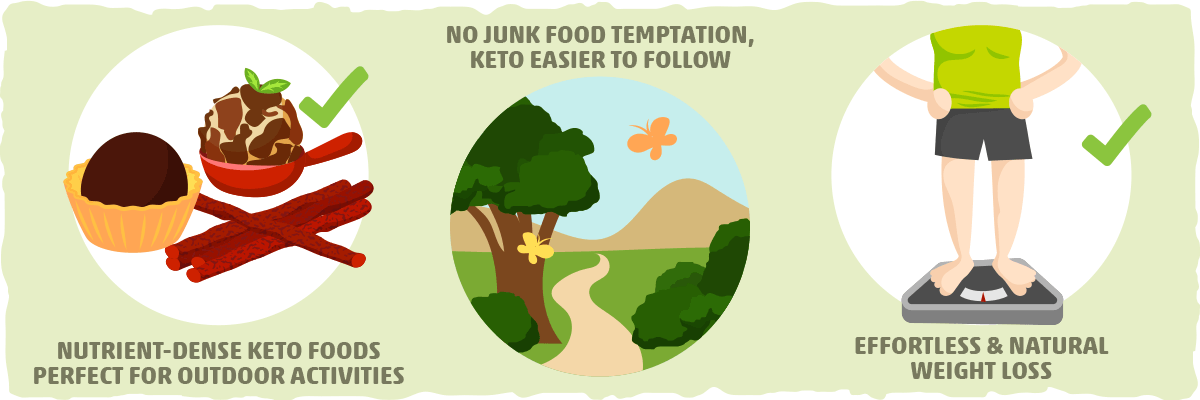

Keto and camping are the perfect combination for two key reasons:
- By eating keto while camping, hiking, or backpacking, you’ll free up more space for nutrient-dense foods that’ll fuel you up, improve your health, and keep you satisfied.
- Keto is much easier to follow when we’re surrounded by nature rather than the temptation of fast food, candy, and high-carb snacks around every corner.
While you’re camping on keto, weight loss is likely to happen effortlessly and naturally as your body burns more fat and ketones for fuel and high-carb foods are no longer readily available.
That being said, jumping on the keto train right before your camping trip won’t be the best strategy. It is crucial to account for the three keto considerations in the next section before you go.
Three Key Keto Camping Considerations: Ketosis, Activity Levels, and Meal Planning
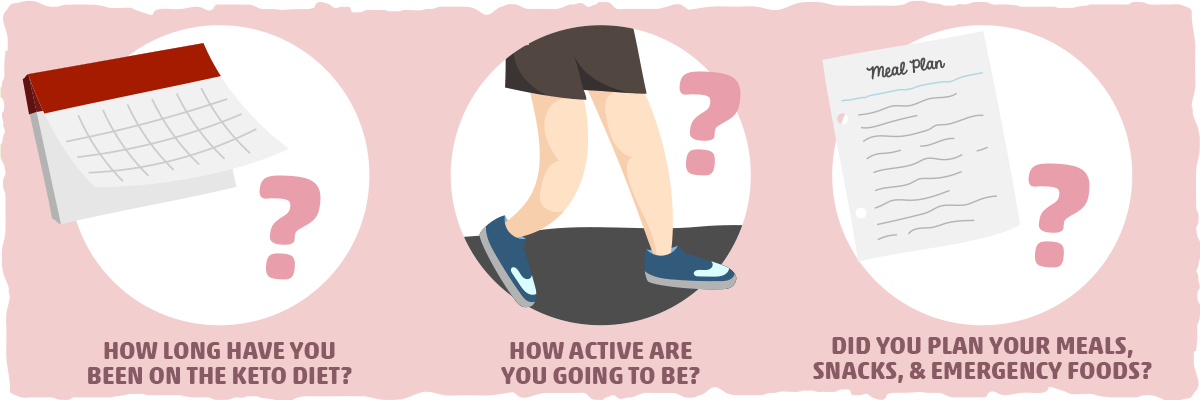

Before you start packing for your camping, hiking, or backpacking trip, there are a few keto-related questions you must consider:
How long have you been on the keto diet?
Before getting into nutritional ketosis, you may experience flu-like symptoms as your body adapts to carb restriction. Though the symptoms usually go away in a few days, you’ll find it hard to be a happy camper during this time.
For this reason, it may be best to give yourself at least 1-2 weeks on a strict ketogenic diet before going on your camping or backpacking trip.
If you are already keto-adapted, then staying keto will be much easier. Plus, you’ll be able to add some extra carbs into your diet to compensate for any long hikes you go on.
On the other hand, if you can’t change your plans, you may want to hold off on strict keto until you get home. Instead, use the camping trip as an opportunity to cut back on high-carb foods and ease your transition into ketosis.
How active are you going to be?
It is crucial to plan your meals and snacks around what your activity levels will be.
In general, how much you eat will depend on these two principles:
- If you’re planning on relaxing more than usual, then you should eat fewer calories. This can be done by slightly decreasing your intake of pure fats and oils (e.g., butter and olive oil).
- In contrast, if you’re going to be more active than usual, then you can eat more calories without gaining weight.
The second principle is particularly important for backpackers or anyone hiking for multiple hours a day. If this substantial increase in activity levels is not compensated for with extra calorie consumption, then your body will start breaking down muscle and won’t be able to recover from the hike.
To get a better idea of how much extra food you’ll need, I’d recommend using a backpacking activity calculator and adding that estimate to the macros you get from our keto calculator.
Did you plan your meals, snacks, and emergency foods?
In general, it is better to over-prepare for your trip. There is nothing worse than having a beautiful serene spot in the middle of the woods and running out of food. (This is especially true for keto backpackers who have no car to get them back to town.)
The easiest strategy is to make sure you have a plan for each meal with extra nutrient-dense keto snacks that can serve as meal replacements if necessary.
How much excess food you pack will ultimately depend on what style of camping or backpacking you decide to do. For example, if you’re backpacking and space/weight are at a premium, you’ll want to prioritize the highest calorie, easy-to-prepare foods with the least water weight.
In contrast, for those of you planning to bring your car and 2 or more coolers, you can be much more flexible with what keto foods, snacks, and meals you have.
With these considerations in mind, the only barrier standing in our way to staying ketosis while camping is knowing exactly what to eat. Fortunately, there are a host of on-the-go keto foods and easy-to-make recipes to choose from.
Keto Camping Food List: What Foods to Eat and What to Avoid to Stay in Ketosis
Before we start prepping, let’s save some space and money by learning what popular camping foods to avoid.
Common camping and hiking foods to avoid on keto:
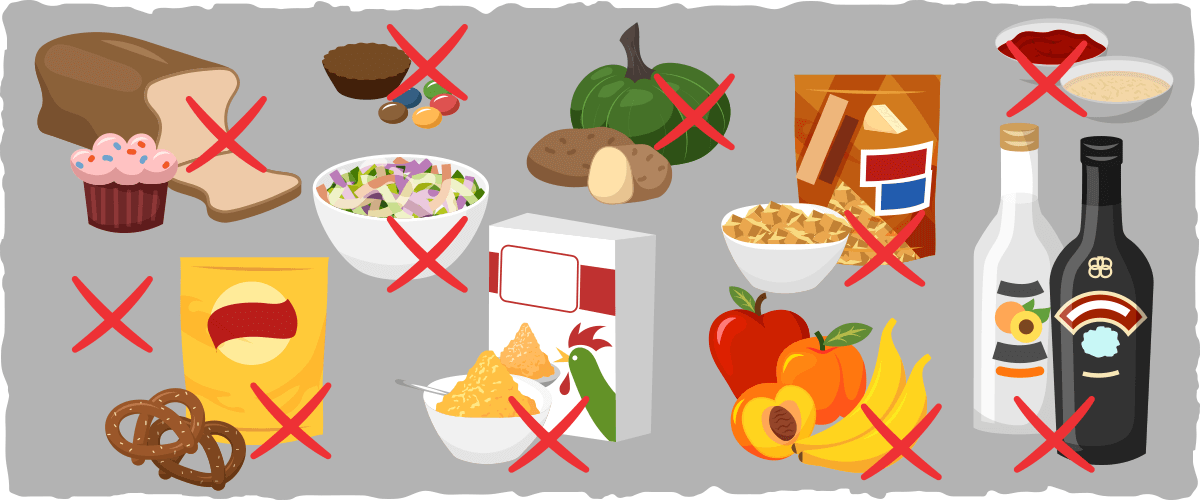

- Bread, buns, and rolls — All baked goods should be avoided on keto
- Chips, pretzels, crackers, and other high-carb snack foods
- “Healthy” trail snacks — Trail mix, Chex mix, energy bars, dried fruit, fruit snacks, and granola are often branded as being healthy trail snacks, but often contain more net carbs than candy or bread.
- Candy — high-sugar chocolates and other sweets. Opt for sugar-free chocolate instead.
- Starchy veggies — potatoes, sweet potatoes, and other starchy tubers
- High-sugar fruits — bananas, apples, pineapples, mango, etc.
- Deli salads and slaws with high-carb ingredients — Premade coleslaws often have added sugars, while popular deli salads, such as potato salad and macaroni salad, feature high-carb ingredients.
- Sugar-added sauces, dressings, and condiments — Ketchup, BBQ sauce, and honey mustard dressing are common sugar-filled campsite culprits. Make sure you find a sugar-free product or make them before you go with keto recipes.
- Cereal, oats, and all other grain-based products
- High-sugar drinks — This includes regular soda, lemonade, milk, and fruit juice.
- High-carb alcohol — Most beers and flavored/sweetened alcoholic drinks are carb-rich culprits. For a complete list of what to drink and what to avoid, read through our guide to keto-friendly alcohol.
Though you may have to ditch these high-carb camping staples, there’s a major upside to keep in mind: By avoiding them, you will free up plenty of space for some of the most satisfying foods.
Healthy Keto Camping Food List
Here’s a summary of our keto camping food list, but scroll down below for a more in-depth look at what to eat and tips on how to include them:


Low-carb Foods to Keep Cool
- Low-carb fruit — Berries, avocado, and tomatoes.
- Low-carb vegetables — Celery, peppers, mushrooms, cabbage, brussels sprouts, asparagus, broccoli, and cauliflower are some examples of keto veggies that keep relatively well without a fridge.
- Fresh meat or vacuum-packed meat — Make sure to keep it chilled and prepare it within 3 to 5 days.
- Hard cheeses — Parmesan, cheddar, cheese sticks, etc.
- Other high-fat dairy products — Heavy cream, cream cheese, sour cream, and soft cheeses.
- Eggs — hard-boiled eggs are particularly easy to pack and incorporate into meals/snacks for extra protein and fat.
- Keto condiments — Sugar-free ketchup, keto bbq sauce, marinara, and sugar-free dressing.
- Fat bombs — A quick high-fat snack or dessert (and the perfect backup food). Easy to make and pack for camping and backpacking.
- Keto tortillas — Make them at home and pack them in the cooler to make a delicious wrap or burrito with the keto camping recipes below. You can even use them to make a simple bacon, egg, and cheese breakfast burrito to start your day.
- Keto bread — Make sweet or savory low-carb bread and bring it for breakfast or the perfect keto bun and sandwich bread replacement.
- Deli meats — For more fat, look for salami, mortadella, and full-fat cold cuts. If you need help getting enough protein, buy some leaner cuts as well (e.g., chicken and turkey).
- Smoked fish — The vacuum-sealed smoked salmon is an example of an easy-to-pack camping-friendly fish option.
- Premade meals or leftovers — Scroll down to the camping recipe section for some keto inspiration.
Frozen Foods
- Sausages
- Bacon
- Your favorite cuts of meat
- Salmon and other fatty fish — defrost then wrap in foil and cook on the campfire
- Shellfish — prawns, for example, are a great option for a quick campfire stir fry
- Cauliflower rice — perfect for quick campfire stir-fries or hash browns
- Low-carb frozen vegetable mixes — Just throw them in your camping pan and stir-fry with meat or fish.
- Frozen berries
Keto Camp Foods With a Long Shelf Life
High-protein options:
- Packets of tuna or other fish — Opt for the fish that is packed in olive oil.
- Canned meat and seafood — chicken, tuna, sardines, mackerel, etc.
- Jerky*
- Pork rinds*
- Turkey pepperoni*
- Meat sticks*
*Make sure there’s no added sugar or artificial ingredients.
High-fat options:
- Coconut Oil
- Olive Oil
- Olives
- Cheese chips — Whisps, Moon Cheese, and homemade cheese chips are all great options.
- Premade keto-approved granola
- Nuts and seeds
- Sugar-free nut butter
- Seed crackers
- Canned coconut cream or milk
- Pemmican
- Sugar-free dark chocolate
- Beef and/or pork pepperoni and other cured meats
- Vacuum-sealed hard cheese
- Premade keto bars — Though there are many “keto-approved” products out there, many of them aren’t as keto-friendly as their labels claim. To ensure you get a nutrient-dense and healthy keto bar, we recommend making them yourself.
Drinks and beverages:
- Water — Bring a water filter and filter water from a stream to save space.
- Coffee or tea
- Keto-friendly alcohol — Unflavored hard liquor, dry red or white wine, and low-carb beers are the most reliable options. However, I recommend reading our keto guide to alcohol before indulging.
For a complete list of keto drinks (with and without alcohol), check out our complete guide to drinks and beverages.
Keto Recipes for Satisfying Camping Meals: Breakfast, Lunch, Dinner, and Dessert Ideas
Rather than mixing and matching from the food list above, you can plan your camping menu ahead of time with the help of the keto recipes below. For each meal, we’ve included recipes you cook over the fire as well as delicious easy-to-store meals you can make before you go.
Keto Camping Breakfast Recipes
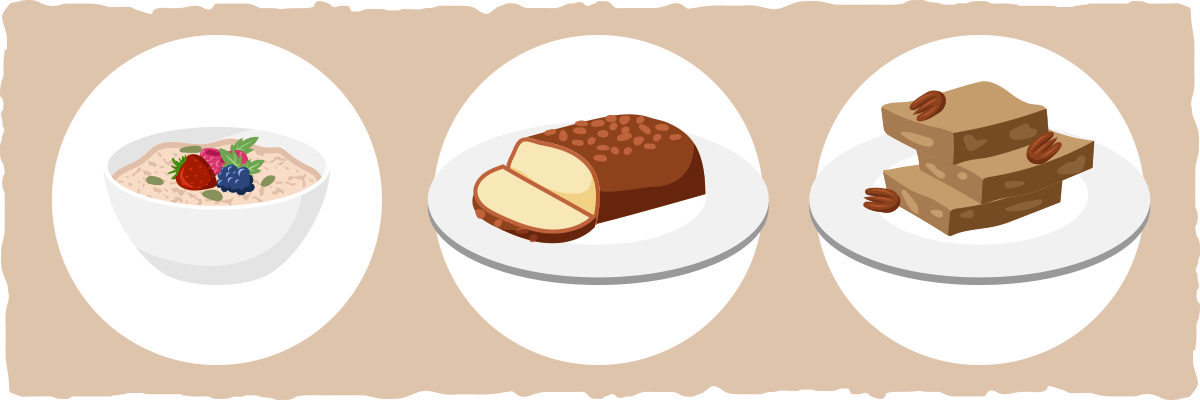

A comforting low-carb “oatmeal” recipe that is perfect for chilly mornings by the campfire. Just mix the dry ingredients before you go and bring your preferred keto-friendly milk alternative with you.
Warm the keto milk over the campfire and stir in the dry ingredients until it resembles oatmeal. Pour your keto “oatmeal” into a bowl and top with crushed nuts, seeds, and/or berries.
Bread that won’t kick you out of ketosis. Make a loaf before you go and toast it in your campfire pan with butter for a quick high-fat keto breakfast. (Missing a few of the ingredients? Check out our other keto bread recipes.)
Keto Zucchini Bread with Walnut Crust
If you prefer to start your morning with something sweet, this keto zucchini bread will be the perfect breakfast. Warm each slice over the campfire and spread with butter, cream cheese, or nut butter for a satisfying low-carb camping meal.
For a quick no-fuss breakfast, bring these fat bomb bars with you. They are nutritious, delicious, and packed with healthy fats, making them a great meal replacement energy bar to bring with you on the trail.
Keto Camping Lunch Recipes
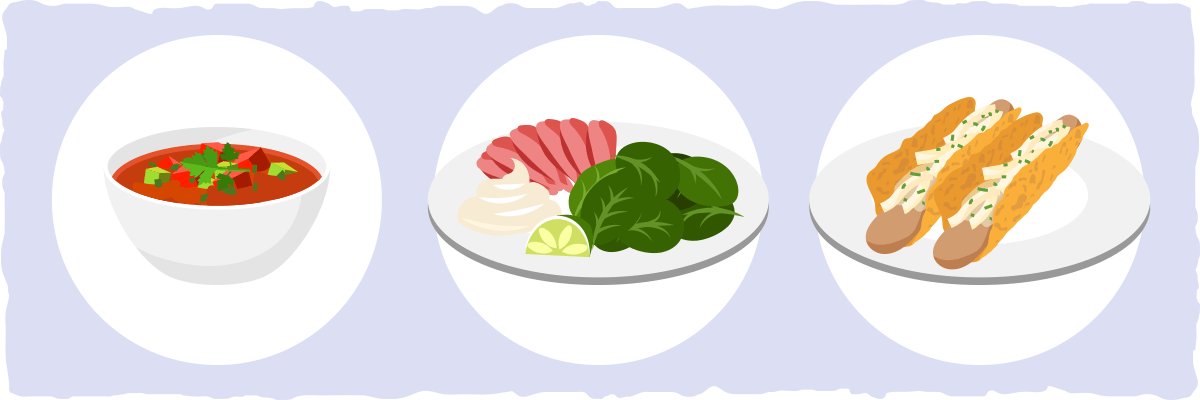

Skip the deli line and make the chicken salad yourself. This keto recipe makes for a quick lunch bowl or a satisfying lunch wrap on a low-carb tortilla.
A hearty, flavorful soup that is incredibly easy to make at home and reheat over the campfire. Don’t forget to add some extra cheese and avocado on top if you need to fuel up for the trail.
Easy Keto Smoked Salmon Lunch Bowl
If you’re looking for a lazy lunch idea, bring these keto recipe ingredients with you and assemble the bowl for a quick meal. Feel free to use any extra lime, greens, or mayo to make tonight’s dinner or tomorrow’s lunch even better.
Though you can have them without the bun on keto, there’s nothing like packing a hot dog with all the fix-ins. Feel free to customize the toppings with your keto favorites, especially if you are bringing beanless campfire chili or pulled pork with you.
Don’t forget to bring the two-ingredient keto hot dog buns with you. They are surprisingly satisfying and can be used as low-carb tortillas or bread replacements if you’re limited on space.
Dinner Ideas for Keto Camping
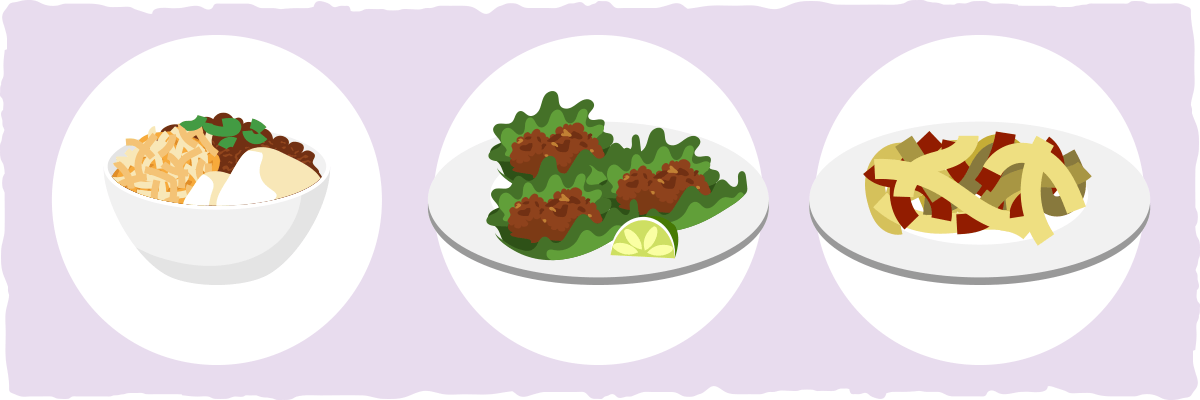

All you need is the right mixture of spices, sugar-free tomato sauce, cheese, and meat to make a delicious campfire keto chili. In fact, this recipe is so simple that you can make it all in one pot over the fire (as long as you skip the sauteed onions and peppers) — or just make a big batch at home and use the fire to warm it up for dinner.
Portobello Mushroom Burger Bun
If you’re craving a juicy burger with all your favorite toppings, this is the recipe is for you. Just clean and marinate the mushrooms and prepare the burger mixture beforehand so that all you have to do is grill them over the fire.
There is nothing like slow-cooked pork by the campfire. Though it’s easier to make it at home and fill your Tupperware to the brim with carnitas, you can also slow-cook the pork shoulder in a large pot over the fire. Just make sure to give it plenty of time to cook — and don’t forget the low-carb tortillas.
One-Pan Cabbage and Bacon Keto Bowl
Bacon, green cabbage, butter, a skillet, a fire, and a trusty knife are all you need to prepare this keto meal. It can also be made as a side dish to accompany your carnitas, burgers, or chili.
To maximize storage space, chop the bacon and cabbage beforehand and pack it into separate containers. You can also cook it up and pack the leftovers for a quick meal or side dish.
Keto Chicken Bacon Ranch Foil Packet Meals
Foil packet meals are an awesome keto camping hack that can save you a ton of time and minimize clean-up. Essentially, you’ll be loading up heavy-duty aluminum foil with your preferred meat, low-carb vegetables, and seasonings, seal them up into a foil packet, and cook them over the campfire and/or grill until done.
As an example, For a quick chicken bacon ranch foil packet meal, follow these six simple steps:
- Tear off a ~15-inch foil sheet and grease it with EVOO
- Mix bit-sized raw chicken pieces with EVOO and ½ teaspoon of ranch seasoning
- Place a cup of broccoli on the center of each sheet, followed by chicken, ¼ cup of shredded cheese, and a piece of crumbled cooked bacon.
- Fold up the edges of each tin foil sheet lengthwise, and fold them over to seal them together. Make sure the packet is sealed.
- Place foil packets on a preheated grill over medium heat or over the campfire. Cook for 10-15 minutes, flipping halfway through. Make sure to check for doneness.
Feel free to customize your own keto foil packet meals as well. Just use the low-carb camping food list and this recipe example as your guide.
Keto-friendly Camping Desserts
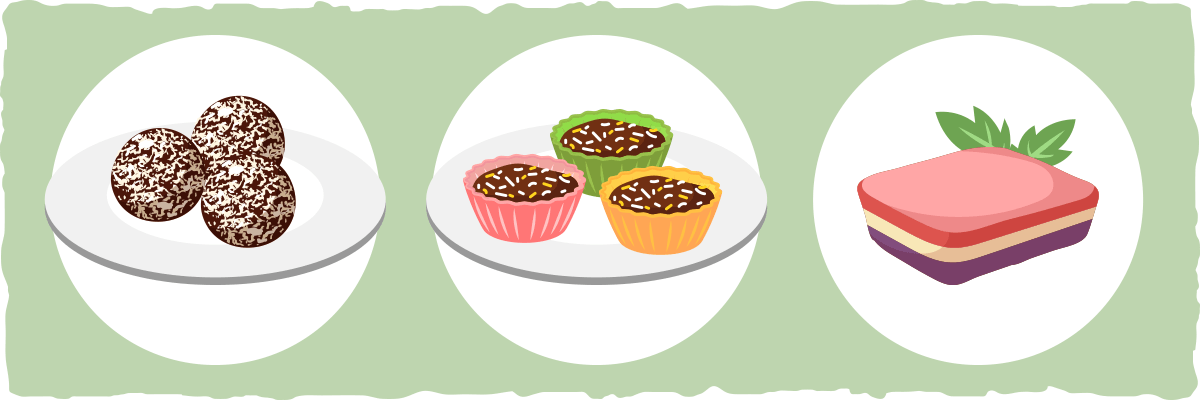

High-fat, low-carb, delicious, and filling, these bars are a must-have if you are craving something sweet or need a reliable keto snack on the trail.
No Bake Chocolate Peanut Butter Fat Bombs
To get your peanut butter and chocolate fix, make a batch of these and take them with you. Feel free to double up the recipe and bring them on the trail for a great hiking snack as well.
These are the perfect desserts for anyone who finds themselves eating a bit too much chocolate candy when they’re camping.
A delicious camp-friendly dessert for fruit lovers, these fat bombs combine chocolate, strawberry, and vanilla with keto sweeteners to satisfy your sweet tooth. If Neapolitan is not your favorite flavor combo, check out our fat bomb guide for more keto camping dessert ideas.
Easy Keto Camping Meal Plan: 3-day Example
To give you a better idea of what keto eating looks like in the great outdoors, we formulated this straightforward meal plan suitable for a long weekend camping trip:
Day 1: The Most Convenient Keto Camping Options
Day 2: Cooking Around the Campfire
Day 3: Just Heat and Eat
Keep in mind that your servings and portion sizes will depend on your specific macronutrient needs and daily activity levels. To figure out how much you should eat to stay on track toward achieving your weight loss goals, use our keto calculator.
Keto Camping Food Tips: How to Minimize Food Waste & Maximize Taste
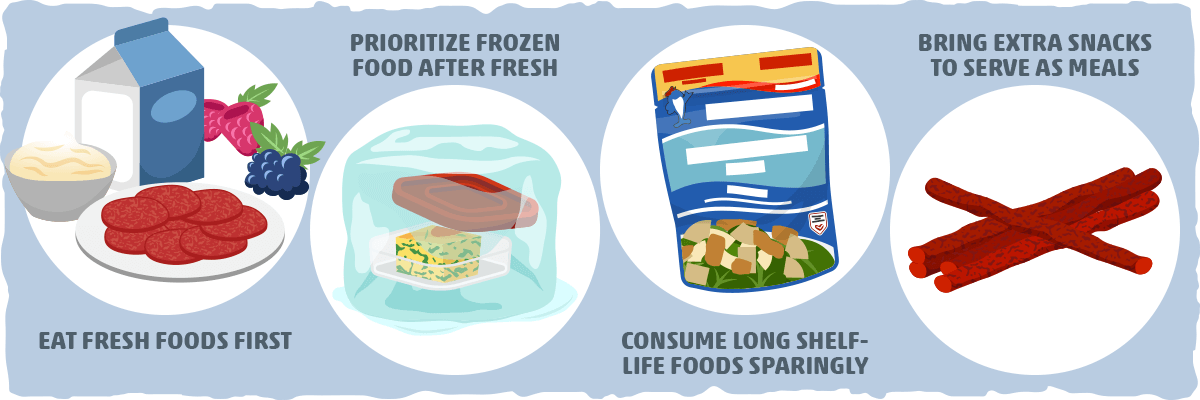

If you’re not sure exactly how to prioritize your foods, meals, and recipes, I recommend following these camping tips:
- Eat fresh food first. Without the climate control of the fridge or freezer, you may find that your fresh foods spoil more quickly than expected. This is why it is best to eat your fresh meat, fruit, non-frozen leftovers, and any spoil-prone dairy products first.
- Prioritize frozen food after fresh. Once your fresh food has been consumed, start eating the frozen food that you brought along with you. This includes frozen meat and pre-made keto meals. Only thaw out what you plan to eat within the next 1-2 days, and keep the rest in your frozen food cooler.
- Consume long shelf-life foods sparingly until you’ve finished your frozen foods/meals. For example, don’t eat your packet of tuna until you’ve made your burgers, carnitas, etc.
- Bring extra snacks that can also serve as high-fat meals. Think of this as your food insurance policy. If something happens to your main meals or if you’re hours deep into a hike and feeling fatigued, keto snacks will be there to save you.
Keep in mind, however, these rules work best for camping trips with the help of cars and coolers. Everything changes when storage isn’t plentiful, climate control is not an option, and we don’t have the luxury of an automobile.
Hit the Trails: Keto Backpacking Meals and the Best Hiking Snacks
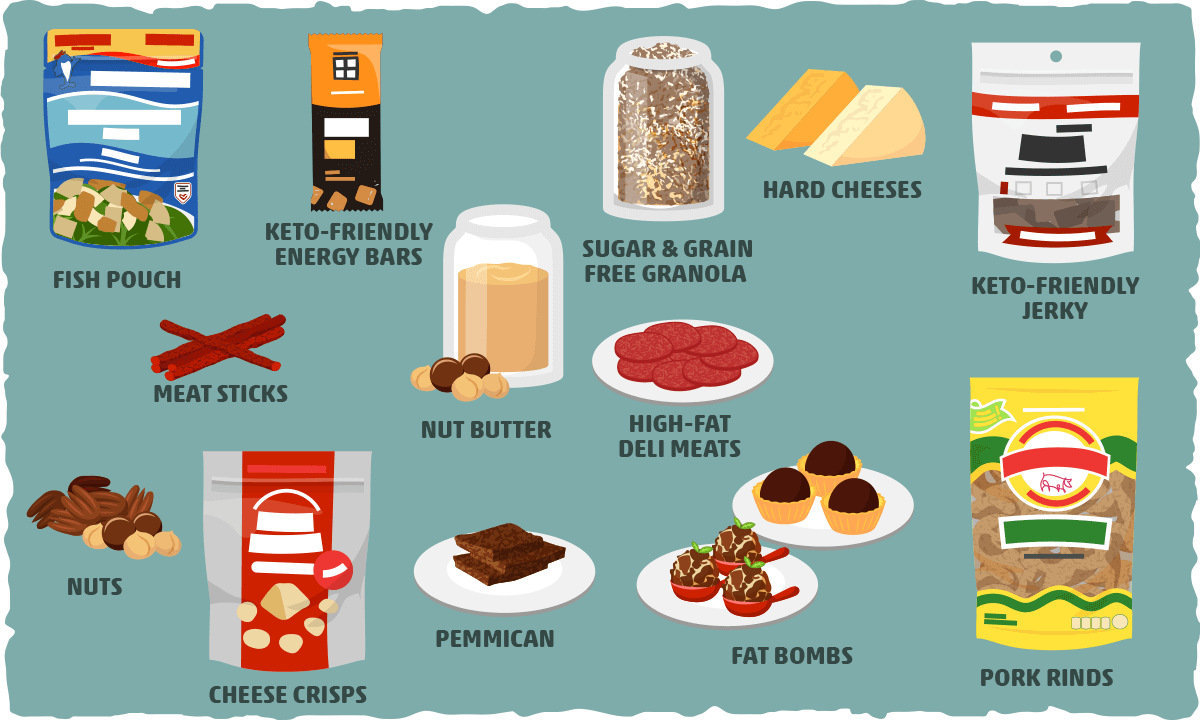

If you are going on long hikes (lasting longer than 2 hours) or backpacking, it is best to prioritize high-fat, low-water foods that will not spoil quickly. These foods tend to take up the least space and provide the most calories, which is crucial when you’re burning up such a substantial amount of energy.
Let’s take a look at the best trail foods that fit into this category, followed by the simplest keto meals you can have after you set up camp at the next spot.
The Best Keto Foods and Snacks for Hiking and Backpacking
- Fish packed in olive oil — Tuna, salmon, mackerel, and sardines with olive oil are the best options. Opt for the pouches rather than the cans if possible.
- Pork rinds — A light-weight, nutrient-dense trail snack that is perfect for keto.
- Nuts — Pecans and macadamia are the highest-fat options.
- Nut butter — Opt for the highest calorie nut butter stored in packets rather than jars. You can make it yourself as well with the help of our nut butter recipe.
- High-fat deli meats — A simple way to fit more fat, protein, electrolytes, and flavor into your trail meals. Make sure to pack them carefully and keep them as cool as you can.
- Hard cheese — It may sound crazy, but opt for a block of the highest-fat cheese rather than individually packed sticks. Just use your knife to create your own cheese stick. This will help minimize waste and maximize space.
- Cheese crisps — Whisps, Moon cheese, and even homemade cheese chips are delicious trail foods. If you are buying bags of cheese crisps, I recommend dumping the crisps into a larger bag and getting as much air out as possible.
- Meat sticks — Packed with protein, meat sticks provide us with an easy way to boost recovery after long hikes.
- Pemmican — A high-fat version of a meat stick.
- Jerky — You can’t go wrong with dehydrated meats on the trail. Have a handful of nuts with the jerky for a high-fat, protein-rich trail meal.
- Fat bombs — Make a batch of your favorite fat bombs with the help of the recipes above and our fat bomb guide. (Note: This will only work if you use fats that won’t melt at the temperatures you are likely to encounter during your trip.)
- Grain-free, sugar-free granola — Find some keto granola on the shelves, online, or make it yourself before you go.
- Keto-friendly energy bars — Whether you use the bar recipes above or purchase some keto bars at the store, these are the easiest way to sneak in a quick high-fat snack or meal. Our favorite’s are Perfect Keto Bars.
Are you looking for more keto trail snack ideas? Check out our complete list of keto-friendly snacks.
Keto Backpacking Meal Ideas and Recipes: Breakfast, Lunch, Dinner, and Dessert
Backpacking meals are not as glamorous as the camping recipes above, but they can still be flavorful and satisfying:
Three Ingredient Backpacker Breakfast Recipe: Rehydrated Keto Cereal
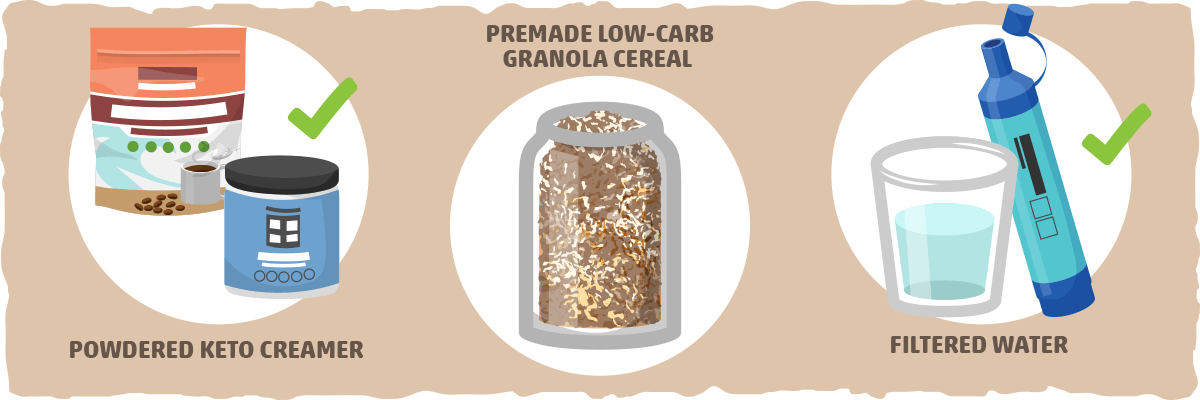

What you’ll need:
- Powdered keto creamer — this can be powdered heavy cream, flavored MCT oil powder, or a powdered keto creamer product.
- Premade low-carb granola cereal — Use our keto recipe or find a keto-friendly granola/cereal in the store.
- Filtered water — Use a trusted water filter to filter water from a nearby stream.
How to make it:
- Mix the creamer with water to make a keto-friendly milk alternative.
- Pour over a bowl of keto granola for a hearty, filling keto backpacking breakfast.
Alternatively, use your rehydrated keto milk to make the campfire keto “oatmeal” from the camping breakfast recipe section above.
Quick Trail Lunch Idea for Keto Hiking — Two Ingredient Tuna Salad
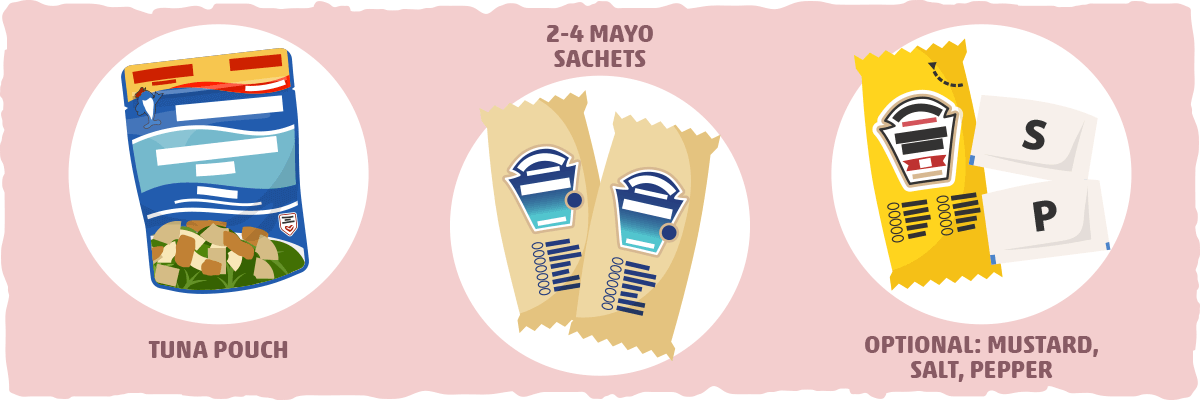

What you’ll need:
- Tuna pouch — Feel free to use any other meat/fish stored in a pouch or can. The best option will be meat/fish packaged in olive oil (not water) and stored in a pouch (not a can).
- 2-4 mayo sachets — Use any mayo you can find at a store, restaurant, or rest stop. Since your activity levels will be so high, there is no need to worry about the 1-2 grams of net carbs that you may find in the mayo.
- Optional: Add yellow mustard, salt, and/or pepper for added flavor. These will likely be found next to the mayo sachets.
How to make it:
- Mix tuna and mayo together in a bowl or the tuna pouch (if there is room).
Alternatively, squirt some mayo on each bite of tuna for a deconstructed trail-friendly tuna salad.
Two Easy Keto Dinner Ideas for Backpackers
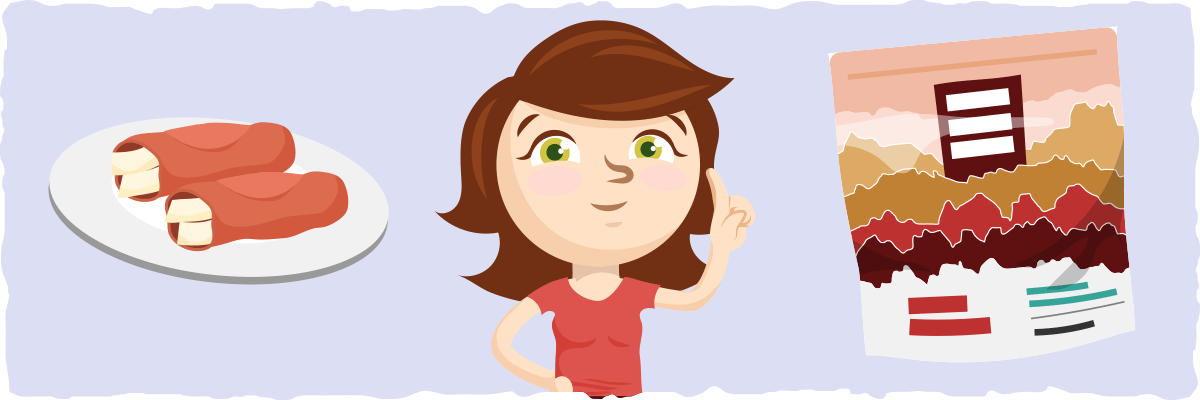

- Meat and cheese wraps with nuts — After a long hike, this’ll taste like a restaurant-quality meat and cheese plate. Just wrap 1-2 slices of your preferred deli meat around a piece of hard cheese. Switch it up with a handful of nuts, so your palate doesn’t get bored.
- Dehydrated keto meals — This the priciest, yet most convenient option. Unfortunately, most dehydrated backpacking meals are high-carb, so make sure you double-check the label. (The most highly-recommended dehydrated meal brand I’ve found for keto backpacking is Next Mile Meals.)
Dessert and Trail Snack Recipes
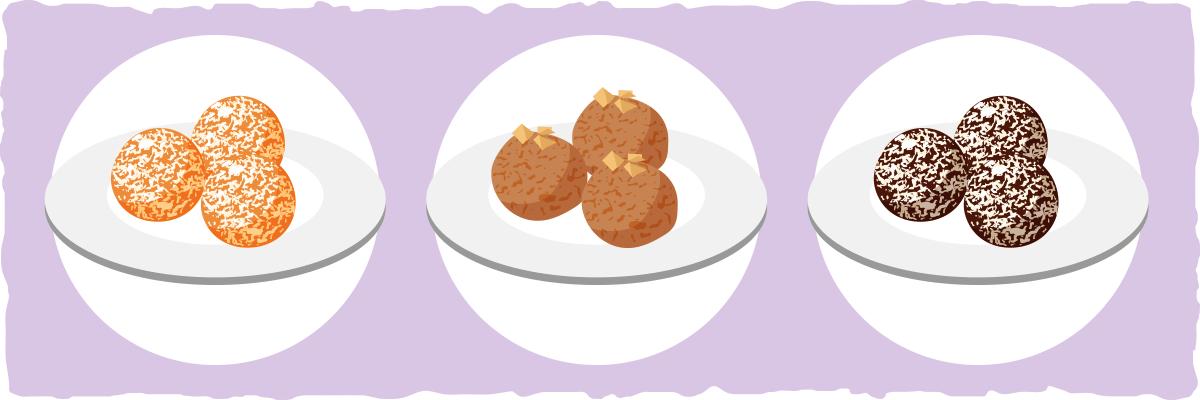

If you’re planning to backpack or hike for multiple hours a day, I recommend having a trail snack and dessert to make sure you have enough food to recover for the next day.
We’ve included three delicious recipes below that make for the perfect snack and dessert:
- Protein-packed nut butter rolls — Also known as “hippie candy,” you can make these by mixing nut butter with whey protein and rolling a portion of the mixture in shredded coconut.
- Double Peanut Butter Balls — Perfect for peanut butter lovers. Make a batch and sneak it into the extra spaces in your backpack before you go.
- Coconut Peanut Butter Balls — Similar to the peanut butter balls, but with one key difference: cocoa powder. These are just as easy to make and are the perfect trail food for satisfying chocolate cravings.
Key Takeaways: Staying Keto While Camping, Hiking, and Backpacking
Regardless of your camping style, it is crucial to keep these two principles in mind so you can stay keto:
- Plan ahead based on your activity levels and food preferences — Know how much you should aim to eat and what to bring based on your camping style. If you are going on long hikes, it’s crucial to consume more food than you normally would.
- Prioritize the right keto foods and recipes — Backpacking means you’ll need plenty of high-fat, low-water foods. In contrast, if you’re camping with your car and coolers, you’ll have much more space and flexibility for fresh and frozen foods.
To make planning for your next keto camping, hiking, or backpacking trip as simple as possible, we’ve included several resources below:
Remember, however, it is best to hit the trails after you are in nutritional ketosis. (This may take up to 2 weeks of strict keto eating.)
If you need help getting started before your trip, the easiest option is to use our keto meal planning app. It will do most of the hard work for you, so all that’s left is to prep your meals and enjoy!